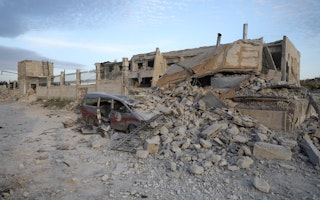Forever No More: From Destruction to Rebirth, the Critical Need for Supporting Syrian Journalism
By Yassin Swehat

Syria stands today as a broken nation. Its cities, economy, and social fabric have all but collapsed. Nearly 90 percent of its population lives below the poverty line, and much of the country’s terrain has been destroyed. Civil peace is fragile. The capabilities of the Syrian state—and the few remnants of its infrastructure that haven’t been fully decimated—are dilapidated and almost useless. International sanctions, particularly from the United States, block any meaningful path to recovery. Yet, amidst this profound devastation, dedicated Syrian journalists remain resolute in their mission to provide the public with access to information vital for the nation’s rebuilding.
On December 8, Syria finally broke free from the rule of the Assad clan, the father, Hafez al-Assad, and his son, Bashar al-Assad, after 54 years, more than half the entire lifetime of the modern Syrian state. Among Syrians both inside the country and in the diaspora, there is a general awareness of the difficulties, dangers, and uncertainties of the country’s path ahead, but this awareness itself, born of tremendous exhaustion, now seeks to achieve stability.
Back in 2011, Syrians tried to say “enough” to decades of tyranny and rose up against Bashar al-Assad. The regime responded with brutal violence, which provoked armed resistance from rebelling communities. What followed was a protracted war in which regional and international powers intervened, further complicated by the rise of jihadist groups that only deepened the suffering of the Syrian people. When Russia intervened to prop up Assad, it seemed as though his rule would last, as his regime’s slogan claimed, “forever.” And yet, last year witnessed the toppling of the dictator and the beginning of post-Assad Syria, or, as we titled it at Al-Jumhuriya, the independent media platform I have had the privilege of co-founding, “Forever No More.”
I co-founded Al-Jumhuriya—and its online journalistic platform, aljumhuriya.net—with other Syrian journalists and writers at the beginning of 2012. Nearly a full year had passed since the beginning of the revolutionary movement in Syria, and our founding team watched with growing concern as the revolution became increasingly complex and the violence escalated. We recognized the need for a platform where we could come together, a place for sharing both our knowledge and our uncertainty. Through sheer determination, our project has weathered the harrowing years of revolution and war, and this March we marked our 13th anniversary, three and a half months after Assad’s fall.
Since then, Al-Jumhuriya has closely examined the emerging power structures in the capital Damascus and provided in-depth coverage of the massacres targeting the minority Alawites in the coastal regions, among other topics.
Syrian journalism, like the country, needs the world’s support. Above all, Syria needs a political system that respects its people’s rights and freedoms, ensuring that they can actively shape their nation’s future. This is a daunting challenge, but it should not be impossible. The path forward requires a thriving Syrian public sphere, with open political discourse and the free flow of news and knowledge.
Independent journalism is an essential part of rebuilding Syria, and in this regard—thankfully—the country is not starting from scratch.
Journalism has long been central to the Syrian struggle for freedom, from the pre-revolutionary era through to the ongoing regional conflict. Many Syrian journalists have sacrificed their freedom or their lives in their unshakeable commitment to truth and to upholding the vital role of their profession.
During the revolution, new journalistic efforts emerged, seeking to institutionalize the central role of the press and create platforms capable of fulfilling journalism’s democratic mission. While many of these initiatives did not survive the dire conditions, some have endured and continue to grow, visibly emerging in towns and cities across Syria, and forming the cornerstones of Syria’s new media landscape.
The challenges of Syrian journalism today are not unique to Syria, as journalists worldwide face many threats and impediments, but in Syria’s context, they are compounded by fewer resources, funding, and support. In recent months, fake news and disinformation about the country have proliferated, often clearly driven by coordinated campaigns. There has also been a sharp rise in polarization and verbal violence, fueled by social media algorithms and policies that have promoted division, escalating dangerous hate speech amid the fragile peace that remains. Syrian journalists are struggling to accumulate and disseminate knowledge about their country’s complex problems, in a way that transcends the sensationalist culture which dominates much of today's media discourse on Syria worldwide.
In this environment, Syrian journalism, like Syria itself, requires the support of the international community to thrive and contribute meaningfully to the country’s rebuilding. Syria’s rebirth, without Assad’s “forever,” is our own rebirth, and we Syrian journalists reinvent ourselves for these new circumstances, striving to help create a healthy Syrian public sphere built on equally healthy doses of knowledge and uncertainty. Our goal remains freedom: as much freedom as possible, nothing less.
Al-Jumhuriya is a grantee of the Open Society Foundations.
Yassin Swehat is co-founder and executive editor of the independent media platform Al-Jumhuriya.


